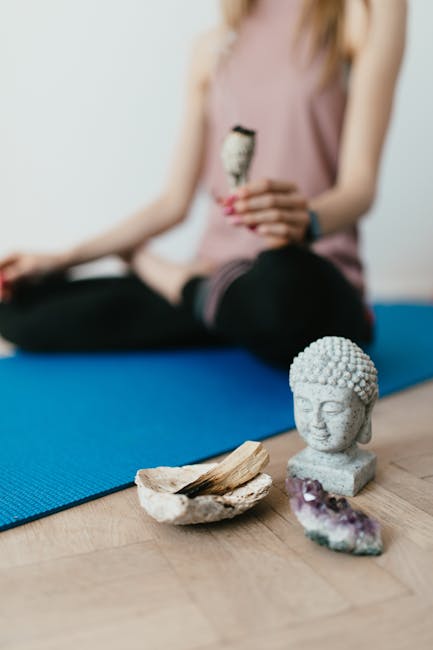Feeling overwhelmed by the hustle and bustle of daily life? You’re not alone. But what if I told you there’s a simple practice that could help you find your center and achieve emotional balance? Yes, it’s meditation, and it’s not just for monks in monasteries. It’s for you, right where you are, in the midst of your busy life.
Key Takeaways
- Understand the basics of meditation and its benefits for emotional balance.
- Learn how self-awareness is enhanced through meditation.
- Discover keystone habits and how meditation can be a transformative practice.
- Explore various meditation techniques suitable for beginners and seasoned practitioners.
- Find out how to integrate meditation into your daily routine for lasting emotional well-being.
- Gain insights into the mental and emotional benefits of meditation and complementary practices.
Introduction to Meditation and Emotional Balance
Overview of meditation as a stress-reduction tool
Meditation is a powerful tool that has been used for centuries to promote relaxation and reduce stress. It involves focusing your mind and calming your thoughts, which can lead to a state of deep peace and heightened awareness.
The connection between meditation and emotional balance
When you meditate, you’re not just giving your mind a break from the chaos of daily life; you’re also learning to observe your emotions without getting swept away by them. This can lead to greater emotional balance and resilience in the face of life’s ups and downs.
The transformative power of regular meditation practice
By making meditation a regular part of your life, you can transform not just your emotional state, but your entire life. It’s a practice that can lead to profound personal growth and a deeper understanding of yourself and the world around you.

The Role of Self-Awareness in Emotional Balance
Meditation’s impact on self-awareness
Meditation shines a light on the inner workings of your mind, helping you become more aware of your thoughts and feelings. This increased self-awareness is a crucial step towards achieving emotional balance.
How increased self-awareness contributes to emotional stability
When you’re more aware of your emotional triggers and thought patterns, you can manage them more effectively. This leads to greater emotional stability and a sense of control over your reactions.
Techniques to enhance self-awareness through meditation
Practices like mindfulness meditation encourage you to observe your thoughts without judgment, enhancing self-awareness and promoting a balanced emotional state.

Keystone Habits and Life Transformation
Definition of keystone habits
Keystone habits are powerful routines that can trigger a cascade of positive changes in your life. They’re the habits that, once established, can revolutionize your entire lifestyle.
The relationship between Cognitive-Behavioral Therapy (CBT) and meditation
CBT is a therapeutic approach that helps you change negative thought patterns. Meditation complements CBT by fostering mindfulness, which can help you recognize and alter these patterns. Learn more about the connection between meditation and CBT.
How meditation acts as a keystone habit for positive life changes
Meditation can be the keystone habit that leads to improved emotional health, better stress management, and even enhanced physical well-being.

Learning and Practicing Meditation
Accessibility of meditation for everyone
Meditation is a practice that’s accessible to all, regardless of age, background, or belief system. It’s a universal tool that can be adapted to fit any lifestyle.
Guided meditation sessions for beginners
If you’re new to meditation, guided sessions can be a great way to start. They provide structure and guidance, helping you learn the basics of the practice. Discover guided meditation sessions for beginners.
1-minute meditation
Even just one minute of focused breathing can serve as an introduction to the benefits of meditation.
10-minute meditation
A 10-minute session can help you reset and refocus, providing a quick but effective mental break.
15-minute meditation
With a 15-minute meditation, you can delve deeper into relaxation and start to experience more significant benefits.
Diverse meditation techniques
There’s a wide range of meditation techniques to explore, each with its own unique benefits.
Body Scan
This technique involves paying attention to different parts of your body in sequence, promoting relaxation and bodily awareness.
Walking Meditation
Walking meditation combines mindfulness with gentle physical activity, making it perfect for those who find it hard to sit still.
Loving-Kindness Meditation
This practice focuses on cultivating feelings of love and compassion, both for yourself and others.

Deepening Meditation Skills for Emotional Equilibrium
Building meditation skills over time
As with any skill, meditation gets easier and more effective with practice. Over time, you’ll find it easier to reach a state of calm and maintain it for longer periods.
Achieving deeper levels of emotional balance
Regular meditation can help you achieve a deeper sense of emotional balance, making you less reactive to stress and more centered in your daily life.
The journey towards life transformation through advanced meditation
Advanced meditation practices can lead to profound insights and life-changing experiences, contributing to your overall emotional and spiritual growth.

Choosing the Right Meditation Practice
Understanding different types of meditation
There are many different types of meditation, from mindfulness to transcendental meditation. Each has its own approach and benefits.
Benefits of various meditation practices
Different meditation practices offer various benefits, from reducing anxiety to improving focus and creativity.
Aligning meditation types with emotional and spiritual needs
It’s important to choose a meditation practice that aligns with your personal emotional and spiritual needs. This ensures that you get the most out of your practice and that it supports your overall well-being.
Integrating Meditation into Daily Life
Simple ways to incorporate meditation into everyday routines
Meditation doesn’t have to be time-consuming. You can integrate it into your daily life with simple practices like mindful breathing or taking a few moments to meditate before bed.
The holistic approach to emotional balance through meditation
Meditation offers a holistic approach to well-being, addressing not just emotional balance but also physical and spiritual health.
Strategies for maintaining a consistent meditation practice
Consistency is key when it comes to meditation. Setting a regular time and place for your practice can help you maintain it as part of your daily routine. Find tips for incorporating meditation into your daily life.

Meditation’s Impact on the Emotional Body
Managing stress and anxiety through meditation
Meditation has been shown to be an effective way to manage stress and anxiety, helping you to remain calm and centered in challenging situations.
Other emotional challenges addressed by meditation
Meditation can also help with other emotional challenges, such as depression, anger, and grief, providing a tool for coping and healing.
The role of meditation in emotional healing and resilience
By promoting emotional healing and resilience, meditation can help you navigate life’s challenges with greater ease and confidence.
Meditation and the Mental Body
Improving focus and clarity with meditation
Meditation can improve your focus and mental clarity, making it easier to concentrate on tasks and make decisions.
Enhancing cognitive function through regular practice
Regular meditation has been linked to improvements in cognitive function, including memory and problem-solving abilities.
The overall mental benefits of sustained meditation
The mental benefits of meditation are extensive, contributing to a sharper mind and a more balanced emotional state.
Complementary Practices for a Balanced Lifestyle
The synergy between regular exercise and meditation
Combining regular exercise with meditation can amplify the benefits of both, leading to a healthier, more balanced lifestyle.
Nurturing the spiritual body through meditation
Meditation can also be a spiritual practice, helping you connect with something greater than yourself and find deeper meaning in life.
Research evidence supporting meditation’s effectiveness in well-being
There’s a growing body of research evidence that supports the effectiveness of meditation in promoting overall well-being. Explore the research on meditation and well-being.
Meditation is more than just a way to relax; it’s a path to transforming your life. By achieving emotional balance through meditation, you can navigate life’s challenges with grace and resilience. So why not start today? Your journey to a more balanced and fulfilling life is just a few deep breaths away.
Unravel the Serenity Within: Your Meditation and Emotional Balance FAQ Guide
What is meditation and how can it transform my life?
Meditation is a practice where an individual uses techniques like mindfulness, or focusing the mind on a particular object, thought, or activity, to train attention and awareness, and achieve a mentally clear and emotionally calm and stable state. By incorporating meditation into your daily routine, you can experience profound transformations such as reduced stress, enhanced self-awareness, improved emotional health, and increased attention span. It’s a tool for rediscovering the body’s own inner intelligence and cultivating a sense of peace.
How long should I meditate each day to achieve emotional balance?
The duration of daily meditation can vary from person to person, but even a short period of 5-10 minutes can be beneficial for beginners. As you become more comfortable with the practice, you can gradually increase the time to 20 minutes or longer. Consistency is key, so aim to meditate regularly to maintain emotional balance and reap the long-term benefits.
Do I need special equipment to start meditating?
No special equipment is needed to start meditating. All you need is a quiet space where you won’t be disturbed. Some people find that a cushion or mat can make sitting more comfortable, but it’s not necessary. The most important thing is to find a comfortable position where you can relax and focus on your meditation practice.
Can meditation help with anxiety and depression?
Yes, meditation can be an effective practice for managing symptoms of anxiety and depression. It helps by promoting relaxation, improving stress management, and teaching mindfulness, which can reduce the impact of negative thoughts and feelings. However, it’s important to note that meditation is not a substitute for professional treatment and should be used as a complementary practice.
Is there a right or wrong way to meditate?
Meditation is a personal and flexible practice, and there’s no single ‘right’ way to do it. Different techniques and styles exist, so it’s about finding what works best for you. The key elements are to focus your attention and to maintain a non-judgmental attitude towards any thoughts or distractions that arise during your practice.
What are some common meditation techniques for beginners?
Common techniques for beginners include focused attention meditation, where you concentrate on a single point such as your breath; mindfulness meditation, which involves paying attention to your thoughts as they pass without judgment; and body scan meditation, where you focus on different parts of your body in turn to promote relaxation. Experimenting with these can help you find the approach that feels right for you.
How does meditation improve emotional health?
Meditation can improve emotional health by reducing stress, increasing self-awareness, and fostering a greater sense of calm and clarity. Regular practice can lead to better regulation of emotions, as it teaches you to observe your feelings without being overwhelmed by them. This can result in more positive thinking, improved relationships, and a deeper sense of overall well-being.
Can meditation improve physical health as well?
Yes, meditation has been linked to a variety of physical health benefits. These include lower blood pressure, reduced chronic pain, improved sleep, and a stronger immune system. The stress-reducing effects of meditation can also contribute to better physical health by decreasing the risk of stress-related illnesses.
What if I can’t clear my mind during meditation?
It’s a common misconception that meditation requires you to clear your mind completely. In reality, meditation is about learning to observe your thoughts without getting caught up in them. When you notice your mind wandering, gently redirect your focus back to your chosen point of attention, such as your breath. This is a normal part of the process, and with practice, it becomes easier.
Are there any resources you recommend for someone new to meditation?
There are many resources available for those new to meditation, including apps like Headspace and Calm, which offer guided meditations and tutorials. Books such as ‘The Miracle of Mindfulness’ by Thich Nhat Hanh and ‘Wherever You Go, There You Are’ by Jon Kabat-Zinn can also provide valuable insights. Additionally, local meditation classes or workshops can offer support and community as you begin your practice.



